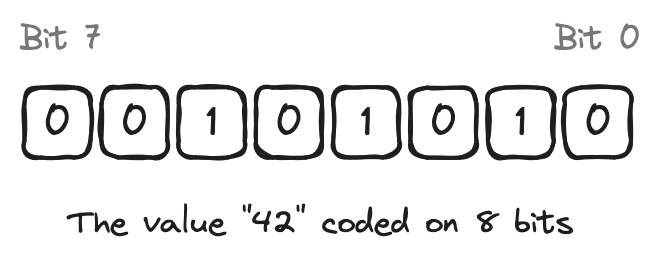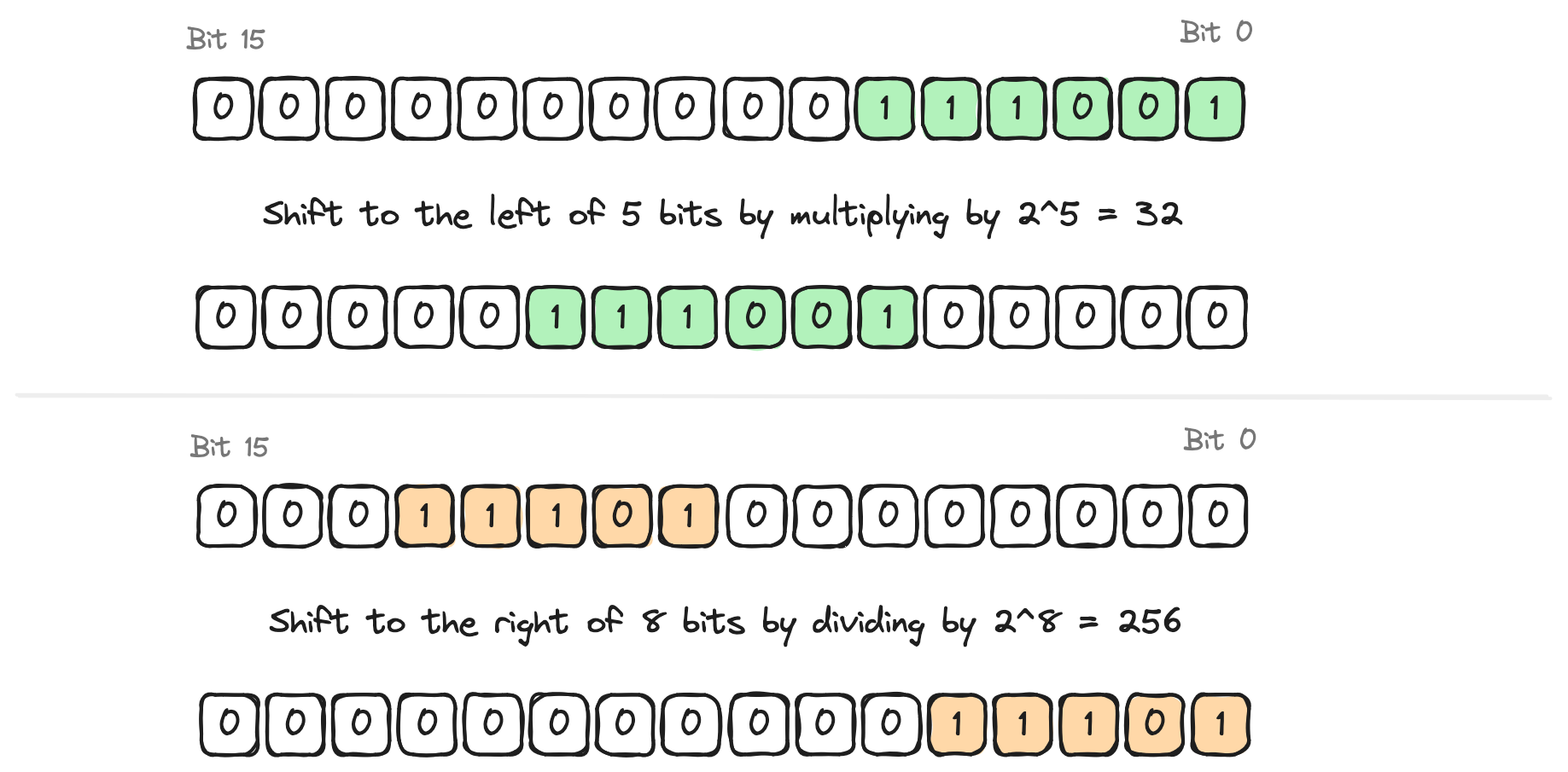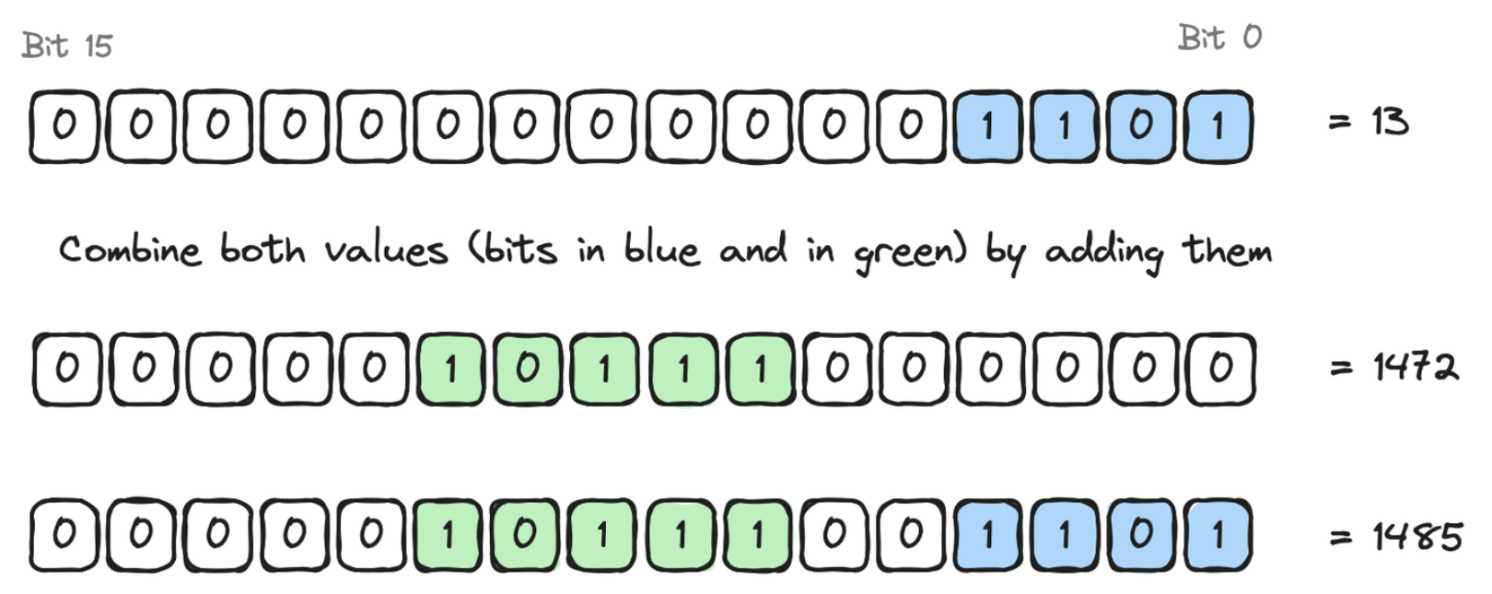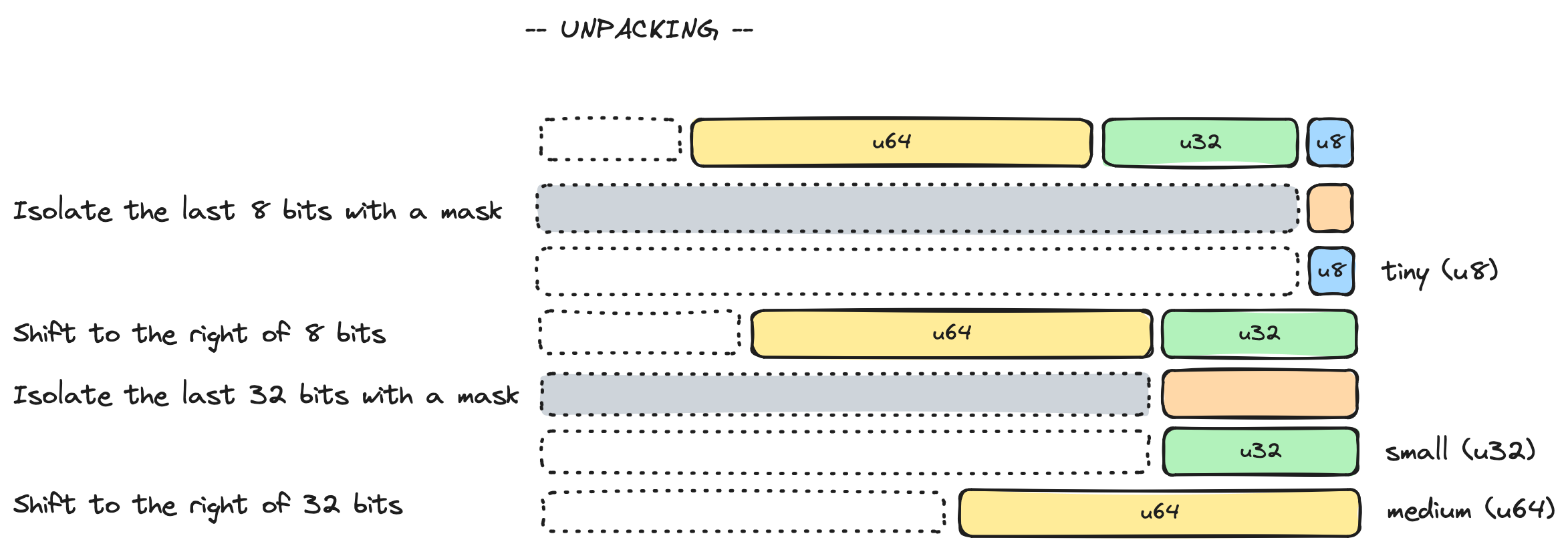Optimizing Storage Costs
Bit-packing is a simple concept: use as few bits as possible to store a piece of data. When done well, it can significantly reduce the size of the data you need to store. This is especially important in smart contracts, where storage is expensive.
When writing Cairo smart contracts, it is important to optimize storage usage to reduce gas costs. Indeed, most of the cost associated with a transaction is related to storage updates; and each storage slot costs gas to write to. This means that by packing multiple values into fewer slots, you can decrease the gas cost incurred by the users of your smart contract.
Integer Structure and Bitwise Operators
An integer is coded on a certain number of bits, depending on its size (For example, a u8 integer is coded on 8 bits).

Intuitively, several integers can be combined into a single integer if the size of this single integer is greater than or equal to the sum of the sizes of the integers (For example, two u8 and one u16 in one u32).
But, to do that, we need some bitwise operators:
- multiplying or dividing an integer by a power of 2 shifts the integer value to the left or to the right respectively

- applying a mask (
ANDoperator) on an integer value isolates some bits of this integer

- adding (
ORoperator) two integers will combine both values into a single one.

With these bitwise operators, let's see how to combine two u8 integers into a single u16 integer (called packing) and reversely (called unpacking) in the following example:

Bit-packing in Cairo
The storage of a Starknet smart contract is a map with 2251 slots, where each slot is a felt252 which is initialized to 0.
As we saw earlier, to reduce gas costs due to storage updates, we have to use as few bits as possible, so we have to organize stored variables by packing them.
For example, consider the following Sizes struct with 3 fields of different types: one u8, one u32 and one u64. The total size is 8 + 32 + 64 = 104 bits. This is less than a slot size (i.e 251 bits) so we can pack them together to be stored into a single slot.
Note that, as it also fits in a u128, it's a good practice to use the smallest type to pack all your variables, so here a u128 should be used.
struct Sizes {
tiny: u8,
small: u32,
medium: u64,
}
To pack these 3 variables into a u128 we have to successively shift them to the left, and finally sum them.

To unpack these 3 variables from a u128 we have to successively shift them to the right and use a mask to isolate them.

The StorePacking Trait
Cairo provides the StorePacking trait to enable packing struct fields into fewer storage slots. StorePacking<T, PackedT> is a generic trait taking the type you want to pack (T) and the destination type (PackedT) as parameters. It provides two functions to implement: pack and unpack.
Here is the implementation of the example of the previous chapter:
use starknet::storage_access::StorePacking;
#[derive(Drop, Serde)]
struct Sizes {
tiny: u8,
small: u32,
medium: u64,
}
const TWO_POW_8: u128 = 0x100;
const TWO_POW_40: u128 = 0x10000000000;
const MASK_8: u128 = 0xff;
const MASK_32: u128 = 0xffffffff;
impl SizesStorePacking of StorePacking<Sizes, u128> {
fn pack(value: Sizes) -> u128 {
value.tiny.into() + (value.small.into() * TWO_POW_8) + (value.medium.into() * TWO_POW_40)
}
fn unpack(value: u128) -> Sizes {
let tiny = value & MASK_8;
let small = (value / TWO_POW_8) & MASK_32;
let medium = (value / TWO_POW_40);
Sizes {
tiny: tiny.try_into().unwrap(),
small: small.try_into().unwrap(),
medium: medium.try_into().unwrap(),
}
}
}
#[starknet::contract]
mod SizeFactory {
use starknet::storage::{StoragePointerReadAccess, StoragePointerWriteAccess};
use super::Sizes;
use super::SizesStorePacking; //don't forget to import it!
#[storage]
struct Storage {
remaining_sizes: Sizes,
}
#[abi(embed_v0)]
fn update_sizes(ref self: ContractState, sizes: Sizes) {
// This will automatically pack the
// struct into a single u128
self.remaining_sizes.write(sizes);
}
#[abi(embed_v0)]
fn get_sizes(ref self: ContractState) -> Sizes {
// this will automatically unpack the
// packed-representation into the Sizes struct
self.remaining_sizes.read()
}
}
In this code snippet, you see that:
TWO_POW_8andTWO_POW_40are used to shift left in thepackfunction and shift right in theunpackfunction,MASK_8andMASK_32are used to isolate a variable in theunpackfunction,- all the variables from the storage are converted to
u128to be able to use bitwise operators.
This technique can be used for any group of fields that fit within the bit size of the packed storage type. For example, if you have a struct with multiple fields whose bit sizes add up to 256 bits, you can pack them into a single u256 variable. If the bit sizes add up to 512 bits, you can pack them into a single u512 variable, and so on. You can define your own structs and logic to pack and unpack them.
The rest of the work is done magically by the compiler - if a type implements the StorePacking trait, then the compiler will know it can use the StoreUsingPacking implementation of the Store trait in order to pack before writing and unpack after reading from storage.
One important detail, however, is that the type that StorePacking::pack spits out also has to implement Store for StoreUsingPacking to work. Most of the time, we will want to pack into a felt252 or u256 - but if you want to pack into a type of your own, make sure that this one implements the Store trait.